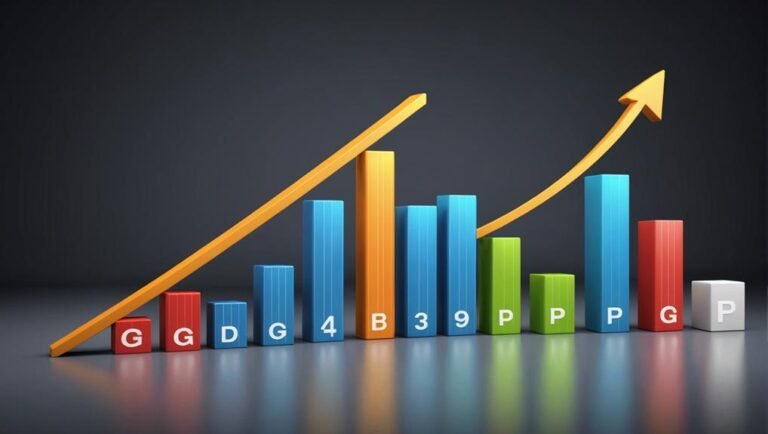What Is Debt Consolidation and When Is It a Good Idea?
Considering debt consolidation to simplify payments and reduce interest? It merges multiple debts into one, often with lower rates, aiding in financial organization and stability. However, be aware of potential credit score impacts, hidden fees, and careful reviewing of terms. Different types of consolidation loans exist – secured with lower rates and unsecured with higher rates. Qualifying involves meeting income standards and evaluating repayment strategies. If intrigued by making debt management more efficient, learning more about consolidation's benefits, risks, and best practices is essential for informed decision-making.
Key Takeaways
- Debt consolidation combines debts into a single payment for easier management.
- It is beneficial when it lowers interest rates and simplifies financial responsibilities.
- Consider it when it reduces the number of bills and helps achieve greater financial stability.
- Review terms carefully to avoid hidden fees and assess cost-effectiveness.
- Qualify based on income, creditworthiness, and choose suitable repayment strategies for successful debt consolidation.
Benefits and Definition of Debt Consolidation
Debt consolidation offers you the opportunity to streamline your financial obligations by combining multiple debts into a single, more manageable payment plan. By doing so, you may benefit from lower interest rates, which can ultimately lead to monthly savings on your repayments. This method helps simplify your financial responsibilities by reducing the number of bills and due dates you need to keep track of.
Whether through personal loans, home equity loans, or balance-transfer credit cards, debt consolidation can potentially ease your financial burden and improve your overall financial outlook. Consider exploring this option to see if it aligns with your goals of reducing debt and achieving greater financial stability.
Working Mechanism and Examples
Exploring how debt consolidation works can provide valuable insights into managing multiple debts effectively. By combining old debts into a new consolidated loan, you can simplify your financial life with fewer bills and due dates.
This process can help in reducing interest rates and lowering monthly payments. For instance, using balance transfer credit cards offering incentives like 0% interest for a period can be advantageous. By paying off smaller loans with the new consolidated loan, you can streamline your repayment process.
An example scenario can illustrate how debt consolidation not only reduces your monthly payments but also decreases the total interest paid over time. Consider these mechanisms when contemplating debt consolidation to improve your financial situation.
Risks and Considerations to Note
Considering the potential drawbacks and risks associated with debt consolidation is vital before proceeding with the process. One significant concern is the impact on credit scores. Taking out a new loan may cause a temporary dip in your credit score, which could affect future borrowing opportunities.
Additionally, hidden fees can be a lurking issue. Debt consolidation companies may charge high fees, potentially increasing the overall cost of the consolidation. It's essential to carefully review the terms and conditions to avoid any surprises.
Opting for self-consolidation with a personal loan or a low-interest credit card is often more cost-effective compared to using specialized services that come with extra costs. Be diligent in evaluating these factors to make an informed decision about debt consolidation.
Types of Debt Consolidation Loans
When seeking to consolidate your debts, it's vital to comprehend the various types of consolidation loans available to make an informed decision.
Secured loans are backed by assets like homes, offering lower interest rates due to the collateral involved. On the other hand, unsecured loans don't require collateral, but they may have higher interest rates to compensate for the increased risk to the lender. It's crucial to evaluate how these interest rates will impact your overall repayment amount.
Additionally, the type of loan you choose can influence your credit score differently. While consolidating debts can initially lower your credit score, making consistent, on-time payments towards a single loan can ultimately help improve your credit standing and increase your chances of qualifying for better rates in the future.
Qualifying and Best Practices
To qualify for debt consolidation and adhere to best practices, meeting income and creditworthiness standards is essential. Lenders typically require proof of employment, income stability, and may assess your financial statements. Understanding your income requirements and choosing the right repayment strategies are vital.
Evaluate your debt amount and ability to repay when considering options like personal loans, credit cards, or home equity loans. Selecting the most suitable approach can help you successfully consolidate your debts. By demonstrating your financial capability and creditworthiness, you increase your chances of qualifying for better rates and terms.
Prioritize responsible financial management to make sure that debt consolidation works in your favor.
Conclusion
To sum up, debt consolidation can be a game-changer for simplifying your finances and getting on track towards a debt-free future. By combining your debts into a single loan or credit card, you can lower your monthly payments and interest rates.
Take control of your financial situation and consider debt consolidation as a smart strategy to ease your debt burden and achieve your long-term financial goals. It's time to take charge of your financial future and make informed decisions that will benefit you in the long run.







